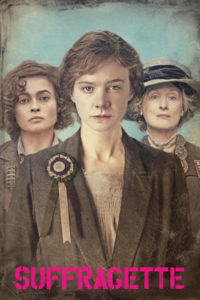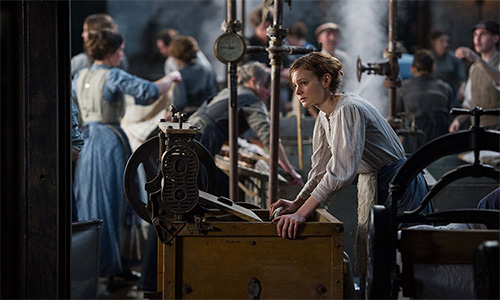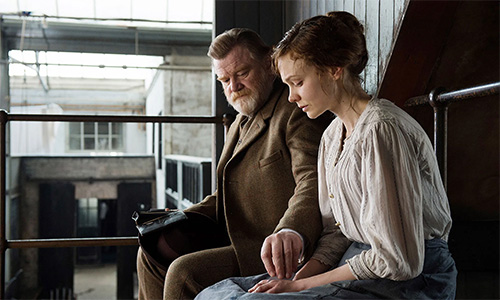
Suffragette tells the true story of a group of women in 1912 London who, after being inspired by Streep’s Emmeline Pankhurst, risk everything in an attempt to get women the right to vote. The story is easy to follow, and the characters are identifiable. But with all that these women risked and all that was done to them, I felt remarkably unmoved by this picture. With that said, not everyone felt the same way that I did. Afterward, I heard someone next to me say, “Wow,” to the person she was with. Perhaps I wasn’t invested enough? Maybe I watch too many movies? Possibly my belief that the film would be nothing more than a boring historical drama before even sitting down ruined any chance I might have had of enjoying it. But for whatever reason, as I kept evaluating this film as I watched it, I kept coming up with the same thing. C+. It was a slightly above-average movie. It will not finish on many end-of-year top ten lists, and it certainly won’t end up on mine. But it certainly is worth watching. And I always like to give movies based on true stories that don’t distort the facts for the benefit of the doubt. And I think that is what Suffragette did here.
Carey Mulligan (An Education, Drive) is fantastic as Maud, a 24-year-old wife and mother of a young son who works under hellacious conditions as a launderer. We learn that women make just 13 shillings per hour compared to their male counterparts, who earn 19. Women also work a third as many hours per week. Her boss is lewd and has a male early 20th century, I-can-do-anything complex. The conditions of the laundromat are hot and hostile while the hours are long and the pay is poor, but there is nothing these Maud or her fellow workers can do to improve their conditions. They have no rights. It’s not just that they have no rights at work. They have no rights at home either. The husband control those rights. This authentically hits home with at least one of the main characters in this movie.
 The character development of these characters, particularly with Maud, is very good. Though we are unaware of the length from the start of the movie until its end, we can safely assume that is a good number of months and maybe even a year. At the beginning of the film, Maud is a quiet woman. She doesn’t have the happiest life overall because of how terrible her job is. Still, she does seem to be content for the few hours she gets to spend each day with her husband Sonny (Ben Whishaw – Spectre, The Danish Girl) and particularly her son George (Adam Michael Dodd). But when she sees co-workers Edith (Helen Brohm Carter – The King’s Speech, Les Miserables) and Violet (Anne-Marie Duff – The Last Station, Notes on a Scandal) fight for all women on her behalf with no success, she becomes involved with the cause, slowly at first and then much more passionately. Maud, Edith, and Violet certainly feel like real characters. Nothing that they did was glamorous, and a lot of what they did receive more backlash than approval, even from other women. The women paid for crimes they committed and even paid for crimes that they did not commit. Still, they were devoted to their cause, and it was because of these three and other women like them, women in London gained the right to vote. Their efforts inspired women in other countries to fight for the right to vote.
The character development of these characters, particularly with Maud, is very good. Though we are unaware of the length from the start of the movie until its end, we can safely assume that is a good number of months and maybe even a year. At the beginning of the film, Maud is a quiet woman. She doesn’t have the happiest life overall because of how terrible her job is. Still, she does seem to be content for the few hours she gets to spend each day with her husband Sonny (Ben Whishaw – Spectre, The Danish Girl) and particularly her son George (Adam Michael Dodd). But when she sees co-workers Edith (Helen Brohm Carter – The King’s Speech, Les Miserables) and Violet (Anne-Marie Duff – The Last Station, Notes on a Scandal) fight for all women on her behalf with no success, she becomes involved with the cause, slowly at first and then much more passionately. Maud, Edith, and Violet certainly feel like real characters. Nothing that they did was glamorous, and a lot of what they did receive more backlash than approval, even from other women. The women paid for crimes they committed and even paid for crimes that they did not commit. Still, they were devoted to their cause, and it was because of these three and other women like them, women in London gained the right to vote. Their efforts inspired women in other countries to fight for the right to vote. 
The movie’s positives were the acting, the character development, the sets, and, of course, the true story. The negatives were the directing, the screenplay to an extent, and the lack of emotion involved with what could have been a moving feature film.
Plot 9/10
Character Development 8.5/10
Character Chemistry 7.5/10
Acting 8.5/10
Screenplay 7.5/10
Directing 5/10
Cinematography 8.5/10
Sound 7.5/10
Hook and Reel 7/10
Universal Relevance 10/10
79%